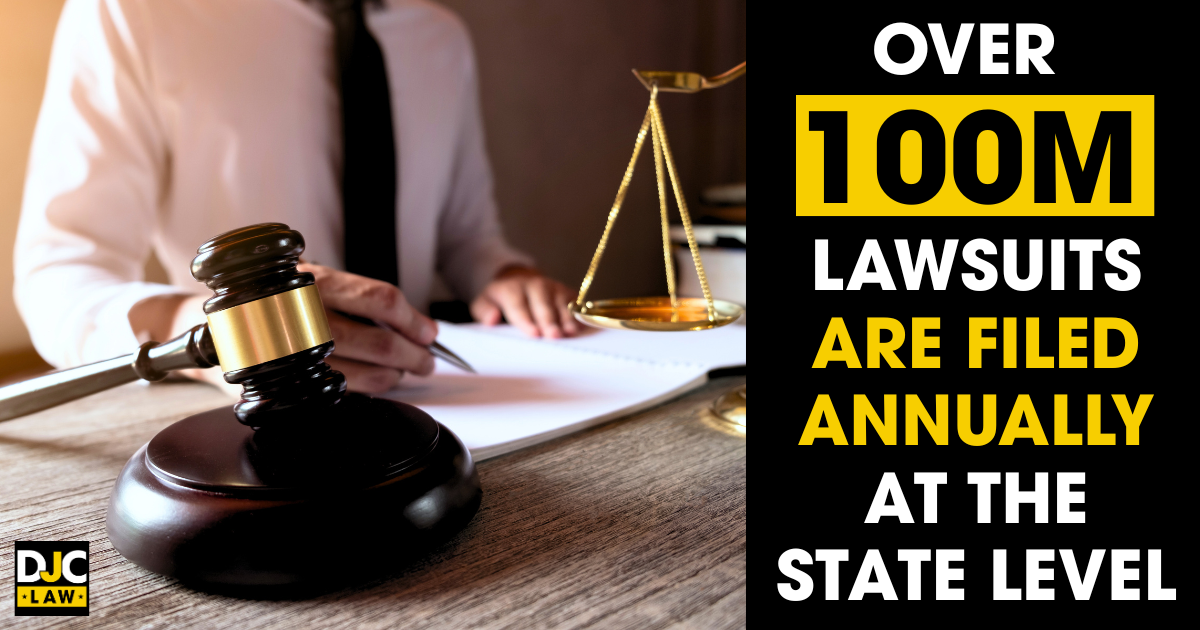What is a Litigation Lawyer? Understanding the Role and Importance of a Litigation Lawyer
Every American, from the great and the good to ordinary hardworking men and women, all have the right to sue if they’re injured or sustain losses due to the actions of others. Whether you’ve been injured in a car accident or seen your reputation damaged due to slander, it’s your right to receive a fair settlement.
According to the Advancement of the American Legal System, over 100 million lawsuits are filed annually at the state level. At the center of every lawsuit is a litigation lawyer. But what do litigation attorneys do, and why are they such an essential part of the legal system?
In today’s article, we’ll go through their role, why they matter, and what advantages they bring to your lawsuit. If you’ve been injured and need guidance, speaking with a skilled personal injury lawyer can greatly improve your chances of a successful outcome.
Key Takeaways
- Litigation lawyers represent clients in various types of civil suits, including personal injury, business disputes, and real estate conflicts.
- The difference between a litigation lawyer and a non-litigation lawyer is that the former deals with legal actions. In contrast, the latter establishes systems to avoid the prospect of legal action in the first place.
- The best time to hire a litigation attorney is as early as possible in the process, including if you’ve received a demand letter or a threat of legal action.
- Some core skills all successful litigation attorneys have in common are communication skills, attention to detail, knowledge of the legal process, and the ability to work with the public and other legal professionals.
- The fundamental functions of a litigation lawyer involve drafting legal paperwork, gathering evidence, building cases, negotiating with opposing legal teams, and preparing their clients for court trials.
- If you’re experiencing a civil dispute, the best option is to contact a lawyer to ensure an amicable resolution.
Defining a Litigation Lawyer
A litigation lawyer primarily focuses on the area of law that sees them representing clients in civil lawsuits. The goal isn’t to send someone to jail to prevent them from going, it’s to win financial compensation on behalf of their clients.
Clio reports that approximately 400,000 personal injury claims are filed annually, and it’s the job of these attorneys to see them through to their conclusion. They take on each aspect of these cases, including gathering evidence, filing personal injury lawsuits, and arguing on your behalf in courtrooms up and down the country.
What Makes a Lawyer a Litigation Specialist?
Litigation specialists operate in the civil area of law by nature. Unlike most litigation lawyers, specialists are highly experienced and regularly appear in court. Many of today’s litigation attorneys only focus on negotiation and handling paperwork, with actual courtroom appearances being rare.
Although not an official term, when the industry refers to a litigation specialist, they refer to a legal professional with ample courtroom experience. That doesn’t mean they want to go to court. A skilled litigation specialist will do everything in their power to avoid a stressful trial.
Many litigation specialists may also focus on specific areas of litigation, including:
- Personal injury
- Car accidents
- Truck accidents
- Slip and fall cases
- Employment disputes
- Business litigation
- Motorcycle accidents
- Tax law
- Workers’ compensation
- Real estate disputes
- Intellectual property law
- Medical malpractice
The Distinction Between Litigation and Non-Litigation Lawyers
A litigation lawyer’s job concentrates on resolving disputes through wielding the mechanisms of the legal system. In contrast, non-litigation lawyers aim to prevent legal disputes before they happen via proactive planning.
For example, while trial lawyers may threaten to file a lawsuit, a non-litigation lawyer is involved in functions like:
- Negotiating deals
- Drafting legal documents and contracts
- Managing compliance
- Providing legal advice
- Setting up legal protections
Both types of attorneys are essential to protecting individuals and businesses, but in different ways.
The Scope of Cases Handled by Litigation Lawyers
Litigation lawyers can deal with a broad variety of cases, making up court pipelines. With the American Bar Association reporting that there are more than 1.3 million lawyers in the U.S., most cases will fall under the umbrella of a litigation lawyer.
That’s why you’ll nearly always see lawyers specializing in a particular area of litigation, whether that’s a personal injury claim, real estate conflict, or financial misconduct issue. Moreover, the scope of a litigation lawyer doesn’t stop there. These lawyers may practice in federal or state courts, or even via private arbitration.
In short, few limits exist on where a litigation attorney might choose to practice within this field of law.
Civil Litigation: An Overview
Civil litigation is the process of multiple parties seeking a settlement. All civil litigation is brought by private parties, and jail time can’t be imposed, regardless of the outcome. According to United States Courts statistics, civil filings in U.S. district courts spiked by 24% in 2023, powered by issues like civil rights violations.
The field of civil litigation covers an enormous number of conflicts, including breach of contract, employment discrimination, and personal injury. Skilled lawyers must understand civil procedure and master the complex documentation involved in filing these cases.
Crucially, unlike criminal defense attorneys, whose goal is to prove guilt beyond a reasonable doubt, the goal of civil litigators is to build persuasive legal arguments based on the balance of probability. Plus, unlike criminal cases, civil litigation rarely results in a trial. According to Duke University, just 1% of federal civil cases filed go to trial.
Common Types of Disputes Addressed
Litigation lawyers deal with a substantial range of disputes, which is why most lawyers, and even most law firms, specialize in one or a few areas. Whether it’s medical malpractice, employment law, construction defects, or auto accidents, all these dispute types fall into the civil litigation category.
Despite civil litigation having such a wide range, litigation attorneys must adapt to each case type because the law differs hugely in each category. Here’s a breakdown of some of the most common types of disputes.
Business Litigation: Navigating Commercial Disputes
Business litigation focuses on the disputes arising from commercial relationships. These could include breach of contract, business fraud, non-compete agreements, shareholder disputes, and more.
Lawyers focusing on business litigation must focus not just on representing their clients and building cases but also on the broader impact of prolonged litigation on the business’s reputation.
According to The Zebra, 90% of businesses will experience some form of civil litigation throughout their lifespan, with 45% of smaller companies being actively involved in at least one suit at any one point.
Personal Injury Cases and the Role of a Litigator
Personal injury law covers clients who have been injured due to negligence or intentional misconduct. It’s one of the most prominent areas of civil litigation, with millions of cases actively on the books at any one time.
According to the U.S. Centers for Disease Control (CDC), 29.4 million people present at emergency rooms every year because of unintentional injuries. The goal of a personal injury lawyer is to prove that the defendant had a duty of care, breached it, and caused the injuries and losses experienced by the plaintiff.
Examples of personal injury cases include:
- Car accidents
- Motorcycle accidents
- Truck accidents
- Slip and fall accidents
- Medical malpractice
- Product liability cases
- Workplace injuries
Handling Complex Financial Disputes
Complex financial disputes often straddle the line between civil and criminal. These cases may involve fraud allegations, which could also see parallel, simultaneous criminal proceedings. However, civil litigation lawyers separate themselves from criminal charges to focus on the losses.
These cases are among the most complex because they involve sophisticated financial instruments and a substantial number of moving parts. It’s not uncommon for corporate lawyers in this area to have an economic background because they can expect to work with experts like forensic accountants and corporate auditors as part of their work.
Additionally, these sums are usually high-value cases, meaning aggressive litigation in the courtroom is crucial to success in this area.
Real Estate Litigation: Common Issues and Solutions
Real estate litigation pertains to civil cases surrounding property ownership disagreements and all of the issues surrounding that.
The most common disputes in real estate litigation include:
- Breach of contract
- Landlord-tenant disputes
- Property line disputes
- Easement disputes
- Title problems
- Construction standards
In real estate litigation, swift conclusions are often prized above actual settlements because drawn-out litigation can lead to far greater losses by delaying sales and developments.
Contractual Disputes: When Litigation Becomes Necessary
Contracts are commitments that form written agreements defining business and personal relationships. If one side doesn’t hold up their end of the bargain, it’s grounds for civil litigation.
Whether it’s breach of contract, not delivering promised services, or payment issues, litigation focuses on interpreting the clauses within the contract. As you’d expect, the focus is on the written agreement and how it might be interpreted and applied.
Interestingly, contract lawyers must also be wary of what litigation does to the relationship. Some relationships are broken forever, and the emphasis switches to aggressive advocacy, but it’s often the case where attorneys must consider negotiation to preserve those relationships long-term.
When to Seek the Services of a Litigation Lawyer
Consult with a skilled litigation lawyer the moment a dispute could result in formal legal action. Don’t make the mistake of waiting until a lawsuit has been officially filed before seeking legal representation, as is most people’s instinct.
The earlier you call upon a lawyer, the better the outcome. Even if the situation doesn’t progress any further, getting an attorney involved prematurely is often enough to allow cooler heads to prevail and prevent the mistakes that could cost you later.
Red Flags Indicating You Need a Litigation Attorney
Several events should be grounds for a consultation with a lawyer immediately, even if no formal legal paperwork has been filed.
Here’s a list of the red flags to bear in mind:
- You’ve received formal correspondence, like a demand letter or a threat of legal action.
- You’ve been served with a subpoena or formal complaint.
- Negotiations with the other party have stalled or broken down.
- The other party’s attorney has contacted you, even if it’s informal.
- Another party has threatened court action.
Benefits of Early Legal Intervention
Involving a litigation lawyer early may seem counterproductive or an escalatory action, but that’s not the case. It’s the greatest form of protection you can provide yourself because you’re getting bespoke legal guidance from day one, preventing missteps that could make the situation worse.
Early legal intervention puts you in a position to control the narrative and be proactive, rather than reacting to what the other parties say. Additionally, it shapes communication as a whole. Alone, even a single careless email could cost you thousands of dollars, whereas a lawyer will take over all communication with the other party for your own protection.
Plus, an attorney is there to identify the hidden risks you could face later. In short, early legal intervention is a faster and more affordable resolution than a full-blown lawsuit playing out in your local county court.
And should the worst come to the worst, the earlier you’ve started working with a lawyer, the more time you give your team to build the most compelling case possible.
The Essential Responsibilities of a Litigation Lawyer
Litigation lawyers work to support you throughout the entirety of your case. They manage each stage of a case’s lifecycle, starting from the initial consultation through to negotiation and battling it out in the courtroom before judges and juries.
Great litigation attorneys are both masters of procedure and broader strategy, aiming to guide the client in a way that serves their shorter and longer-term interests. So, what do they do in more detail?
Drafting and Filing Legal Documents
Managing legal documentation is one of the core roles of a lawyer and one that requires knowing the intricacies of the legal system. Simple mistakes can derail lawsuits and have enormous consequences, making diligence one of the fundamental talents of a successful lawyer.
Some of the legal documents these lawyers handle include:
- Petitions
- Complaints
- Answers
- Counterclaims
- Motions
- Discovery documents
- Pretrial briefs
- Trial pleas
- Appeal documents
Case Investigation and Research Techniques
Litigators will build your case from the ground up, obtaining evidence and putting it all together to make the most convincing case possible.
It starts from interviewing their clients and getting their side of the story to calling in witnesses and reviewing essential paperwork, such as contracts and financial records. Additionally, they might consult experts in their fields, whether medical professionals, economists, or accident reconstructionists.
Beyond your case, litigators will examine similar cases to understand legal precedent and how it relates to case law.
Negotiating Settlements: Strategies for Success
Most cases will never go to trial because it rarely serves either party’s interests. Negotiated settlements bring disputes to a faster conclusion and save everybody money.
Lawyers must be skilled negotiators who know when to attack and when to compromise. These negotiations may occur informally or via the formal court-managed process known as mediation.
Courtroom Representation: What to Expect
Cases that can’t be resolved through negotiation or mediation inevitably go to trial. Unfortunately, many lawyers have little in the way of real-world courtroom experience. That’s why clients must focus on hiring attorneys experienced in trial resolutions and willing to go to trial if it means preserving their best interests.
The set of skills required to represent someone in court successfully is wholly different from the rest of the case lifecycle and includes:
- Presenting arguments
- Examining and cross-examining witnesses
- Introducing evidence
- Objecting to improper conduct
- Dealing with judges and juries
Additionally, lawyers must be able to brief their clients on handling the formal procedures of appearing in civil court. Courtroom appearances are stressful, and it’s up to legal professionals to guide them through these pressure-cooker environments.
Skill Set of an Effective Litigation Lawyer
Litigation lawyers must possess a particular set of skills if they’re going to succeed in the legal trade. Legal knowledge alone is insufficient because attorneys need that rare mixture of communication skills, personability, and a tactical mind to stand head and shoulders above their peers.
So, what should you look for when hiring a litigation lawyer?
- Communication Skills – Litigators must be able to present complex ideas using logic and persuasiveness to everyone from judges and juries to their own clients. Tailoring messages to each audience is the ability to grasp victory from the jaws of defeat.
- Organizational Abilities – Ordinary people look at the average legal case with bewilderment. With so many requirements, deadlines, and documents to handle, attorneys must manage all moving parts because a single mistake could destroy a case.
- Attention to Detail – The devil really is in the details. Litigators must be able to spot small errors that could ruin a case and find the tiny pieces of evidence within documents and witness statements that strengthen their cases.
- Negotiation Strategies – Negotiation is how most cases are resolved. Bringing along a toolbox of tailored negotiation strategies drives favorable settlements that preserve the best interests of clients, whether that’s a monetary settlement or a swift end to litigation.
- Adaptability – The legal landscape is constantly changing. Being able to recalibrate in the face of changes to the law and developments within cases is the only way to stay ahead of the opposing counsel and outmaneuver them.
Leading legal professionals understand that none of these fundamentals can be compromised because they make clients vulnerable. That’s why if you’re searching for an attorney, you should prioritize these skills, and the lack of them must be considered a red flag.
Deciding Between a Litigation Lawyer and Alternative Legal Representation
Civil litigators are a particular type of lawyer, but are they right for you? Ideally, litigation lawyers are called in when there’s a risk that a conflict or dispute is at risk of escalating into a formal legal proceeding. If this is the case, a litigation lawyer must always be considered your go-to option.
However, you might want to consider alternative legal representation earlier in the process. Non-litigation attorneys, such as general counsel, may be a better option. These types of lawyers can prevent disputes from becoming disputes, or at least act as a deterrent to further escalation.
When to Consider Non-Litigation Solutions
Non-litigation solutions include arbitration and informal negotiation. If parties are open to compromise, this is a viable route that can prevent long-running litigation, which costs everyone money, time, and stress.
So, when should you consider a non-litigation option?
- The dispute is a simple misunderstanding.
- The conflict can be resolved with a structured conversation.
- You want to maintain a personal relationship.
- The damages at stake are minimal to moderate.
- You’d rather maintain confidentiality, such as via Alternative Dispute Resolution (ADR).
It should also be mentioned that many contracts often include clauses that require parties to go through a dispute resolution process before resorting to lawsuits. If this is the case, a non-litigation lawyer will be non-negotiable.
The Pros and Cons of Mediation vs. Litigation
Mediation and litigation have their roles in resolving disputes. Although mediation can evade formal lawsuits, it only works when the other party wants to cooperate. In contrast, litigation can overcome bad faith and enable the disclosure of essential information.
So, let’s go into the advantages of each.
Mediation
- Lower costs
- Faster resolutions
- Easier to preserve personal/business relationships
- Confidentiality maintained
- More control
However, none of that works if the other party acts in bad faith. Moreover, there’s no judge or jury to enforce a resolution gained via mediation.
Litigation
- Compels discovery
- Guarantees formal testimony
- Overcomes bad-faith tactics
- Deals with more serious legal issues
- Judgements are binding and enforceable
The downsides are that litigation takes time and money. Furthermore, lawsuits are a matter of public record, meaning the idea of confidentiality vanishes. It’s also not uncommon for formal litigation to permanently burn bridges between parties.
Conclusion: The Importance of Choosing the Right Litigation Lawyer
Opting for litigation means you want to give yourself the best possible chance of success. You need a lawyer with the correct skillset and a long track record of winning cases for their clients. At DJC Law, this is precisely what we provide.
With decades of collective experience, DJC Law has forged its reputation as one of the leading law firms in Texas. We’ve won over $400 million in settlement money for our clients and boast a 99% case win rate. Contact us to get your free consultation, and let’s discuss your case.
Frequently Asked Questions About Litigation Lawyers
What are the typical costs involved in hiring a litigation lawyer?
Hiring a litigation lawyer depends on the payment model used by said attorney. Some attorneys charge an hourly or flat fee, whereas others use the contingency fee model, where they only get paid if they win a settlement. The contingency model is most common in personal injury litigation.
How long does a litigation process typically take?
It’s impossible to say how protracted litigation could take, as every case is unique. Most cases take anywhere from a few months to a year, but more complex cases could take multiple years to resolve, especially if appeals are involved.
What should you expect during your first consultation?
Initial consultations are designed to get the lay of the land. A litigation attorney handles these consultations by getting to know the background and context of your case, alongside your side of the story. The goal of the first consultation is to assess the case and establish a fee structure before deciding whether to move forward.







